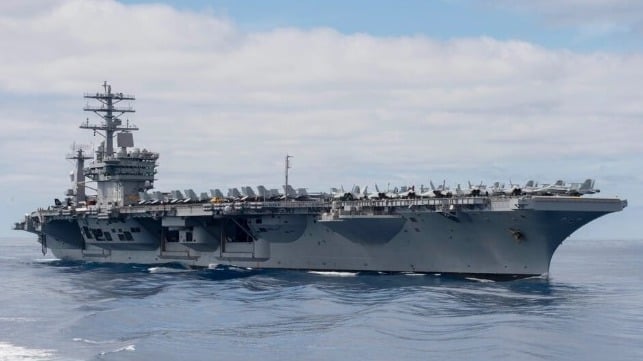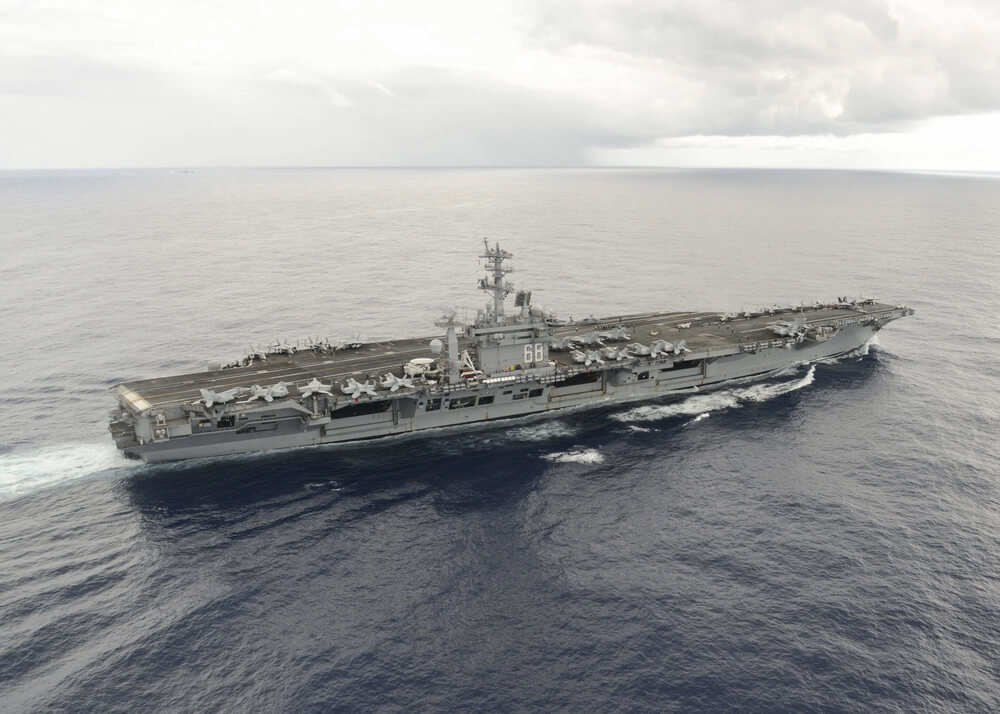U.S. Navy Preplanning Decommissioning of Nuclear-Powered USS Nimitz

Preplanning for the deactivation of the USS Nimitz, currently the United States’ oldest active aircraft carrier is beginning. Today, April 21, is the initial response date for the U.S. Navy’s presolicitation for the inactivation, defueling notice posted on April 6. Firms interested in subcontracting opportunities that could emerge from the project were instructed to contact Huntington Ingalls’ Newport News Shipbuilding, which will be responsible for the project.
The effort is starting even though the Navy has yet to finalize a date for the nuclear aircraft carrier to be deactivated. However, the Navy is required to present the notice of its intent to launch the decommissioning process while it expects to solicit and negotiate with only one source. Potential subcontractors are instructed to submit capability statements that will be considered by the government. The notice says that only qualified sources capable of performing refueling and complex overhauls on a large deck nuclear-powered aircraft carrier will be involved in this project.
The Navy has been discussing for several years the date for the Nimitz to retire. In 2018, the U.S. Congress directed the Navy to consider extending her life while they were waiting for the Gerald R. Ford to be completed and work to proceed on her sisterships.
It now appears according to the schedules in the Navy’s long-range shipbuilding plan sent to the U.S. Congress in March 2023, that the Nimitz will be retired in 2026. Previously, it had been reported that they would begin the offloading process in 2025 with the vessel officially set for inactivation in 2027.
The carrier began her current deployment in December 2022. She embarked Carrier Air Wing 17 and met up with her carrier group off San Diego. Recently it was reported that she had arrived in the Philippine Sea with her group which includes the Ticonderoga-class guided-missile cruiser USS Bunker Hill, and the Arleigh Burke-class guided-missile destroyers USS Decatur and USS Wayne E. Meyer. This comes after it was reported in January that she was conducting routine operations in the South China Sea marking the first time she had entered the region on her 2022-2023 deployment. Before reaching the Philippine Sea, the group also conducted a maritime exercise with the Japan Maritime Self-Defense Force and the Republic of Korea Navy.

USS Nimitz was the first of a class of 10 nuclear carriers but is now past her projected 50-year lifespan (US Navy photos)
Built by Newport News Shipbuilding Co., construction on the Nimitz began in June 1968 and she was deployed for the first time on May 3, 1975, as the leader in the Navy’s first class of nuclear aircraft carriers. She was developed based on the information learned from the predecessor the USS Enterprise and would be the first of a class of 10 nuclear carriers, that was completed with the USS George H.W. Bush commissioned in 2009.
The Nimitz has had a distinguished career including seeing deployment in the Indian Ocean in 1980 after the U.S. Embassy was seized in Iran. She would support operations off Libya, Lebanon, and multiple deployments to the Persian Gulf and the Pacific. Designed for a 50-year career, the carrier has gone through a life extension and extended maintenance periods, as the Navy works to plan out her final deployments.
The hope is that the Nimitz will be simpler to recycle versus her predecessor the U.S.S. Enterprise which a decade later remains at Newport News Shipbuilding as the plans for her disposal continued to be debated. The cleanup began shortly after the Big E as she is known officially ended operations. By 2018 the nuclear defueling of her eight reactors in four compartments was completed. However, the Government Accounting Office has been critical of the process for the Enterprise.
In August 2022, the Navy released the long-awaited draft environmental impact statement with four proposed options for the carrier. Three options call for dismantling the ship either in partnership with private enterprise or by private enterprise, possibly with the Department of Energy taking responsibility for the reactors and the propulsion compartments or disposing of the reactor plant in authorized waste disposal sites. A fourth option is to continue her in waterborne storage which is estimated to cost $10 million per year. The National Environmental Policy Act requires the Navy to proceed in a manner that is the least harmful to the environment.

that matters most
Get the latest maritime news delivered to your inbox daily.
The Navy also has a greater sense of urgency to begin the planning for the Nimitz because the current plan calls for her sistership the nuclear carrier Dwight D. Eisenhower to follow in 2027. Further, the third ship of the subclass, the Carl Vinson, is also expected to follow shortly thereafter as she is only five years younger than the Ike.
One of the elements that the Navy is considering is that the Nimitz class is both slightly smaller but critically has a more compact nuclear plant. Each vessel has only two nuclear reactors compared to the eight on the Big E. It is anticipated that the recycling plan would follow from the decisions reached for the Enterprise. Currently, the Navy plans to finalize the plan for the Big E by the end of 2023.
